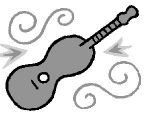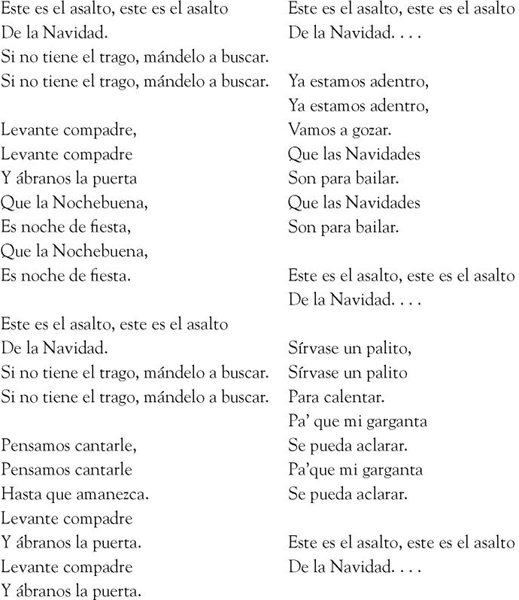Las Christmas (22 page)

Coquito
COCONUT EGGNOG

When he sent us this recipe, Ray Suárez included the following instructions: “If you are a hard-ass, a traditionalist, or an
Independentista,
you must begin by preparing coconut milk from scratch with a whole coconut and a hammer. You've got to soak the meat, strain it in cheesecloth, and set it aside. Otherwise you can buy packaged coconut, soak it, and drain the pulp from the liquid. Or you can do the easiest thing of allâbuy canned coconut milk (sorry). You cannot prepare this recipe in advance, because it's just not a good idea with raw eggs (salmonella threat). If you want to get a jump in your frantic last-minute preparations, I suggest you mix up the
coquito
not much more than 2 hours beforehand. Since I always end up drinking this with people I really love, I suggest you do the same.”

Mix all the ingredients in a blender, and blend at very high speed for over a minute. Chill in the refrigerator for 1 to 2 hours. Shake well, and serve.
Makes
10
to
15
servings

EL ASALTO
The Holiday Assault
LIKE THE posadas of Mexico, the parrandas of Puerto Rico go from house to house singing traditional Christmas songs. The best
parrandas
take you by surprise. Known as
el asalto,
the assault, the idea is that the targeted hosts should be fast asleep when the musicians appear at the door asking to be let in and given a drink (specifically, rum). Anytime during the Christmas season (early December to Three Kings Day on January 6), a family that retires early can expect to wake up in the wee hours to the sound of neighbors strumming a
cuatro
or guitar, scratching a
güiro,
shaking maracas, and singing.
There are many verses to the
El Asalto
song, often improvised on the spot by the musicians and/or the hosts. The song reproduced here is one of many variations. The first verse, repeated as a chorus, announces the musicians' surprise visit. “If you don't have rum,” they sing, “send for it.” The visitors then ask to be let in. “Nochebuena,” they remind the hosts, “is a night for feasting.” When the door is opened and the
parranda
has moved inside, the musicians promise a night of celebration. “Navidades is for dancing,” they state. After everyone has danced and had their fill of food and drink, the
parranda
moves on to another house, often joined by the hosts of the previous
asaltos.

Acknowledgments
WE HAD AN EXTENDED Christmas this year, full of surprises and high emotions. The months we spent organizing this book stretched the holiday, kept us humming
aguinaldos
through the humid days of August and beyond, as the leaves changed color and then dropped to form a thick carpet on the ground. Throughout the summer and fall we received wonderful gifts: stories, poems, treasured recipes, and songsâthe legacy of traditions kept alive through the willpower of people unwilling to forget their heritage.
We are deeply grateful to the twenty authors, some of whom were immersed in novels or other long works in progress, who stopped to remember. Our humble thanks to the
mamis
, the aunts and in-laws, the relatives often more than once removed, who for the first time in their lives measured ingredients as they cooked so that we could present their recipes in an easy-to-duplicate form.
Mil gracias
to Laura, Jennifer, Emily, and Daniel Cohen, Sandra, Essie, and Alex Cohen, Francesca and Miranda Jones, Karen Dressner, Judith Azaña, Ginger Varney, and Ila Cantor, who chopped, crushed, stirred, wrapped, sautéed, fried, and baked as we tested the recipes. Steven and Laura Cohen opened their home to us, gave us free rein in their spacious kitchen, and confirmed that the qualities we associate with Christmasâgenerosity, celebration of life, family ties, friendship, traditions, and funâcan be daily miracles to be treasured.
Two special friends, our agent, Molly Friedrich, and our editor, Robin Desser, not only nurtured the book along, but also joined the cooks and the revelers during the memorable cook-a-thon that brought Las Navidades to Westchester County a month early. Now they can both wrap
pasteles
and tamales like experts.
Esmeralda's husband, Frank Cantor, in true cinema verité fashion, braved the craziness in the test kitchens to create a memorable video of us looking by turns frazzled, elated, and exhausted, while Lucas Cantor soothed us with his jazz guitar.
Finally, our heartfelt thanks to Eileen Rosaly for introducing us to each other. That meeting resulted not only in a joyful collaboration, but in a wonderful friendship.
ESMERALDA AND JOIE
Permissions Acknowledgments
Grateful acknowledgment is made to the following for permission to reprint previously published material:
Doubleday: “Good Night to
Nochebuena
” excerpted from
Next Year in
Cuba: A Cubano's Coming of Age
by Gustavo Pérez Firmat, copyright © 1995 by Gustavo Pérez Firmat. Reprinted by permission of Doubleday, a division of Bantam Doubleday Dell Publishing Group, Inc.
Judy Vásquez: “JÃbarismos” by Judy Vásquez, copyright © 1997 by Judy Vásquez (
El
Boricua,
December 1997). Reprinted by permission of the author.
A Note About the Illustrator
JOSÃ ORTEGA was born in Ecuador in 1965 and graduated from the School of Visual Arts in 1988. The recipient of numerous awards for a wide range of work, he currently lives in New York City.

Esmeralda Santiago and Joie Davidow
LAS CHRISTMAS

Esmeralda Santiago is the author of two memoirs,
When I Was Puerto Rican
and
Almost a Woman
(both
available in English and in Spanish from Vintage), and a novel,
América's Dream.
She lives in Westchester County, New York.

Joie Davidow was a founder of the
L.A. Weekly, L.A. Style
magazine, and
SÃ,
a national Latino lifestyle publication. She lives in Los Angeles.
ALSO BY ESMERALDA SANTIAGO
When I Was Puerto Rican
América's Dream
Almost a Woman

First Vintage Books Edition,
October
1999
Copyright © 1998 by Cantomedia, Inc., and Joie Davidow
Illustrations copyright © 1998 by José Ortega
The following essays appeared in the December 1996 issue of Sà magazine: “The Three Kings Lose Their Way,” “PeMex Xmas,” “Merry Crisis and a Hyper New Year!,” “Next Year in Havana,” “Nurturing the Wild Beast of Christmas,” “A Baby Doll Like My Cousin Jenny's,” “Barrio Humbug,” and “Oy! What a Holiday!” “Switching to Santicló” first appeared in
Latina
(December 1997); “Un Poquito de Tu Amor” in the
Los Angeles Times
(February 1998).
Owing to limitations of space, all acknowledgments for permission to reprint previously published material may be found on
Permissions Acknowledgments
.
Vintage and colophon are registered trademarks of Random House, Inc.
The Library of Congress has cataloged the Knopf edition as follows:
Christmas (Alfred A. Knopf, Inc.)
Las Christmas: favorite Latino authors share their holiday memories / edited by
Joie Davidow and Esmeralda Santiago. â 1st American ed.
p. cm.
1. ChristmasâLatin America. 2. Christmas cookeryâLatin America.
3. ChristmasâUnited States. I. Davidow, Joie. II. Santiago, Esmeralda.
GT4987.155.C57 1998
394.2663'089'68âdc21 98-15884
CIP
eISBN: 978-0-307-42655-0
v3.0
